希特勒的崛起【英文】
- 格式:ppt
- 大小:7.26 MB
- 文档页数:69
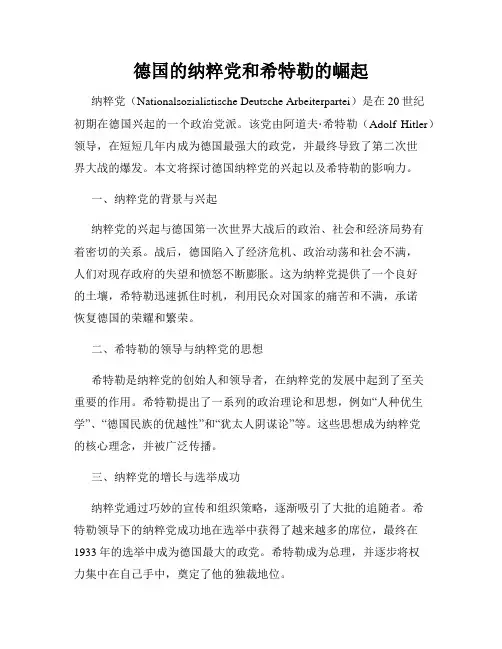
德国的纳粹党和希特勒的崛起纳粹党(Nationalsozialistische Deutsche Arbeiterpartei)是在20世纪初期在德国兴起的一个政治党派。
该党由阿道夫·希特勒(Adolf Hitler)领导,在短短几年内成为德国最强大的政党,并最终导致了第二次世界大战的爆发。
本文将探讨德国纳粹党的兴起以及希特勒的影响力。
一、纳粹党的背景与兴起纳粹党的兴起与德国第一次世界大战后的政治、社会和经济局势有着密切的关系。
战后,德国陷入了经济危机、政治动荡和社会不满,人们对现存政府的失望和愤怒不断膨胀。
这为纳粹党提供了一个良好的土壤,希特勒迅速抓住时机,利用民众对国家的痛苦和不满,承诺恢复德国的荣耀和繁荣。
二、希特勒的领导与纳粹党的思想希特勒是纳粹党的创始人和领导者,在纳粹党的发展中起到了至关重要的作用。
希特勒提出了一系列的政治理论和思想,例如“人种优生学”、“德国民族的优越性”和“犹太人阴谋论”等。
这些思想成为纳粹党的核心理念,并被广泛传播。
三、纳粹党的增长与选举成功纳粹党通过巧妙的宣传和组织策略,逐渐吸引了大批的追随者。
希特勒领导下的纳粹党成功地在选举中获得了越来越多的席位,最终在1933年的选举中成为德国最大的政党。
希特勒成为总理,并逐步将权力集中在自己手中,奠定了他的独裁地位。
四、希特勒的统治与纳粹德国希特勒利用纳粹党的力量,建立了一个极权主义的国家,被称为纳粹德国。
他通过推行各种政策和法律,加强了国家控制和国民意识形态的一体化。
希特勒对犹太人的种族迫害和侵略行动导致了数百万人的死亡和战争的爆发。
五、纳粹党的衰落与战争的结束纳粹党虽然取得了一定的成功,但随着战争的进行,德国面临日益严重的困境。
1945年,纳粹德国最终战败,希特勒自杀,纳粹党被解散。
六、纳粹党和希特勒的遗产纳粹党和希特勒的兴起与崛起对德国和世界都造成了深远的影响。
第二次世界大战带来了巨大的破坏和人员伤亡,对德国和全球的经济和政治秩序产生了长期的冲击。
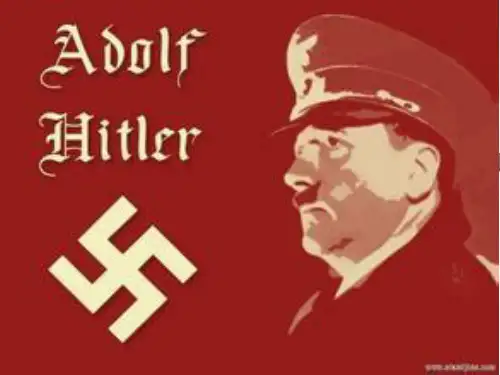
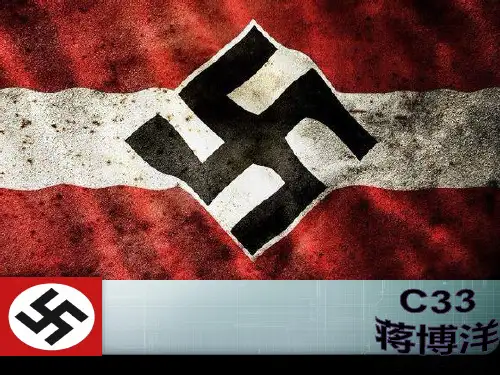
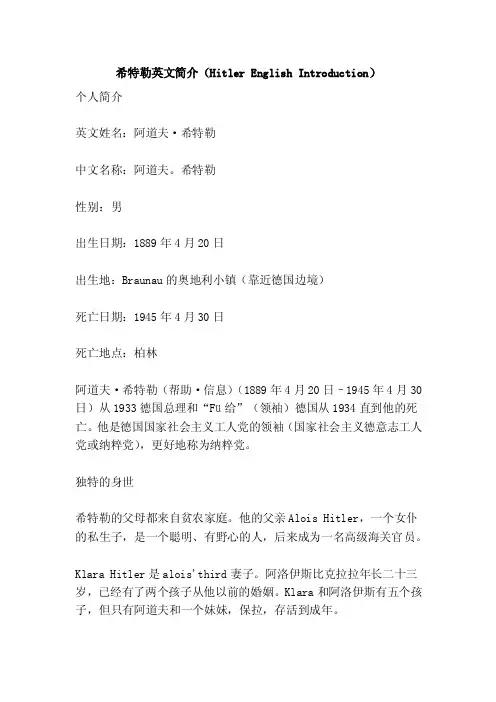
希特勒英文简介(Hitler English Introduction)个人简介英文姓名:阿道夫·希特勒中文名称:阿道夫。
希特勒性别:男出生日期:1889年4月20日出生地:Braunau的奥地利小镇(靠近德国边境)死亡日期:1945年4月30日死亡地点:柏林阿道夫·希特勒(帮助·信息)(1889年4月20日–1945年4月30日)从1933德国总理和“Fü给”(领袖)德国从1934直到他的死亡。
他是德国国家社会主义工人党的领袖(国家社会主义德意志工人党或纳粹党),更好地称为纳粹党。
独特的身世希特勒的父母都来自贫农家庭。
他的父亲Alois Hitler,一个女仆的私生子,是一个聪明、有野心的人,后来成为一名高级海关官员。
Klara Hitler是alois'third妻子。
阿洛伊斯比克拉拉年长二十三岁,已经有了两个孩子从他以前的婚姻。
Klara和阿洛伊斯有五个孩子,但只有阿道夫和一个妹妹,保拉,存活到成年。
发展过程1.student2.soldier3.do在小学4.stop试图成为第一研究最喜欢的游戏艺术5.move维也纳6.receive父亲的公务员养老7.volunteer FR德国军队在慕尼黑9.rebuild8.be纳粹aarty其他士兵逮捕10.establish第三帝国11.base专制mand他的军队去打仗13.die希特勒与中日关系的两面性希特勒关于中国和日本1的想法。
鄙视日本看好中国他看着日本。
但是,他看好中国。
2。
喜欢中国茶叶希特勒喜欢喝中国茶。
3。
希特勒不准报道南京大屠杀希特勒不允许人们报告南京大屠杀。
阿道夫。
希特勒已经不再是之一个人,他泛指了一个时代的血型与残暴,扭曲与狭隘。
他是法西斯的象征,而他背后,是第二次世界大战的开始与终结。
阿道夫·希特勒不再是一个人,他是指血液和残酷的时代,失真和狭窄。
他是法西斯的象征,在他身后,是第二次世界大战和结束的开始。
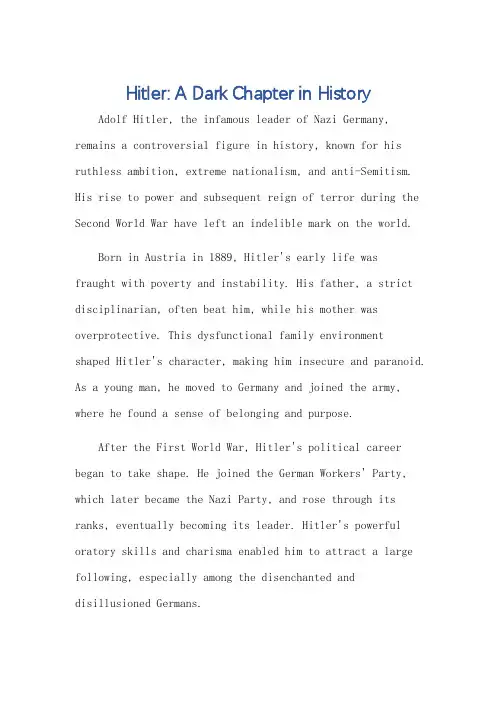
Hitler: A Dark Chapter in HistoryAdolf Hitler, the infamous leader of Nazi Germany, remains a controversial figure in history, known for his ruthless ambition, extreme nationalism, and anti-Semitism. His rise to power and subsequent reign of terror during the Second World War have left an indelible mark on the world.Born in Austria in 1889, Hitler's early life wasfraught with poverty and instability. His father, a strict disciplinarian, often beat him, while his mother was overprotective. This dysfunctional family environment shaped Hitler's character, making him insecure and paranoid. As a young man, he moved to Germany and joined the army, where he found a sense of belonging and purpose.After the First World War, Hitler's political career began to take shape. He joined the German Workers' Party, which later became the Nazi Party, and rose through its ranks, eventually becoming its leader. Hitler's powerful oratory skills and charisma enabled him to attract a large following, especially among the disenchanted anddisillusioned Germans.Hitler's political philosophy was based on extreme nationalism, anti-Semitism, and social Darwinism. He believed that the German race was superior to all others and that the Jews were a threat to German society. He advocated for the expansion of German territory and the elimination of all perceived threats to the Reich.Under Hitler's leadership, the Nazi Party gained significant political power in Germany. In 1933, Hitler became the Chancellor of Germany and quickly consolidated his grip on power. He abolished democratic institutions, established a totalitarian state, and began to implement his radical agenda.Hitler's reign of terror was marked by widespread discrimination, persecution, and violence. Jews, homosexuals, political opponents, and others were targeted for elimination. Concentration camps were established, and millions of people were killed or enslaved. Hitler's ambitions led him to invade numerous countries, including France, Belgium, the Netherlands, and Russia, in a bid for world domination.The Allied Powers, led by the United States, Great Britain, and Russia, eventually defeated Germany in the Second World War. Hitler's reign came to an end in April 1945, when he committed suicide in his bunker in Berlin, rather than face capture and trial.The legacy of Hitler and the Nazi era is complex and multifaceted. While Hitler's actions and ideologies were barbaric and reprehensible, they also serve as a stark reminder of the dangers of unchecked ambition, intolerance, and hatred. Hitler's rise to power and the atrocities committed under his leadership are a cautionary tale forall nations and generations.**希特勒:历史中的黑暗篇章**阿道夫·希特勒,纳粹德国的臭名昭著的领导人,以他冷酷无情的野心、极端民族主义和反犹太主义而臭名昭著,在历史中是一个充满争议的人物。

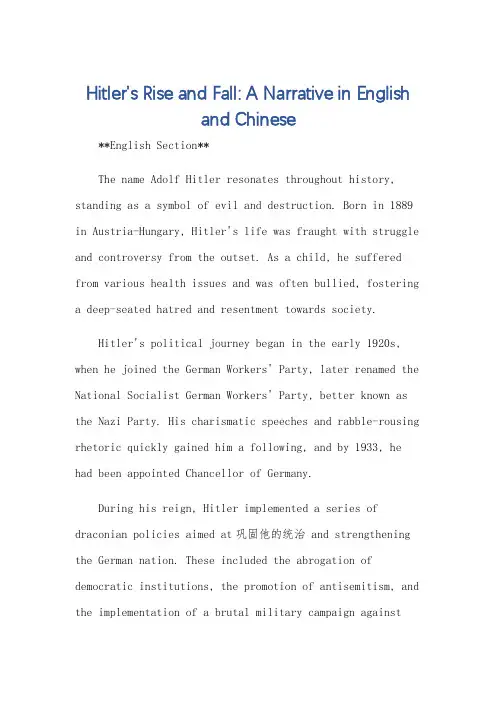
Hitler's Rise and Fall: A Narrative in Englishand Chinese**English Section**The name Adolf Hitler resonates throughout history, standing as a symbol of evil and destruction. Born in 1889 in Austria-Hungary, Hitler's life was fraught with struggle and controversy from the outset. As a child, he suffered from various health issues and was often bullied, fostering a deep-seated hatred and resentment towards society.Hitler's political journey began in the early 1920s, when he joined the German Workers' Party, later renamed the National Socialist German Workers' Party, better known as the Nazi Party. His charismatic speeches and rabble-rousing rhetoric quickly gained him a following, and by 1933, he had been appointed Chancellor of Germany.During his reign, Hitler implemented a series of draconian policies aimed at巩固他的统治 and strengthening the German nation. These included the abrogation of democratic institutions, the promotion of antisemitism, and the implementation of a brutal military campaign againsthis neighbors. Hitler's ambitions were not limited to Europe; he had grandiose plans to establish a thousand-year Reich that would encompass all of Europe and beyond.Hitler's most notorious act was the initiation of the Second World War in 1939. His aggression led to the deaths of millions, not only in Europe but also in Asia and the Pacific. Hitler's obsession with racial purity led to the systematic persecution and murder of Jews, Poles, and other minorities through the infamous Holocaust.However, Hitler's reign of terror did not last forever. By 1945, the Allies had advanced into Germany, and Hitler's days were numbered. On April 30th, 1945, Hitler committed suicide, bringing an end to his tyrannical regime.**Chinese Section**希特勒的崛起与覆灭阿道夫·希特勒这个名字在历史中回响,成为邪恶与毁灭的象征。
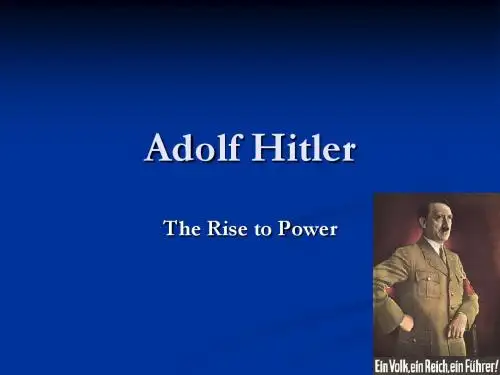
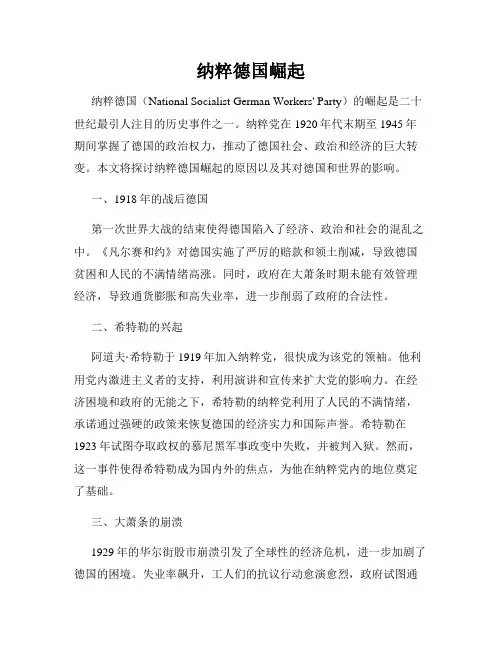
纳粹德国崛起纳粹德国(National Socialist German Workers' Party)的崛起是二十世纪最引人注目的历史事件之一。
纳粹党在1920年代末期至1945年期间掌握了德国的政治权力,推动了德国社会、政治和经济的巨大转变。
本文将探讨纳粹德国崛起的原因以及其对德国和世界的影响。
一、1918年的战后德国第一次世界大战的结束使得德国陷入了经济、政治和社会的混乱之中。
《凡尔赛和约》对德国实施了严厉的赔款和领土削减,导致德国贫困和人民的不满情绪高涨。
同时,政府在大萧条时期未能有效管理经济,导致通货膨胀和高失业率,进一步削弱了政府的合法性。
二、希特勒的兴起阿道夫·希特勒于1919年加入纳粹党,很快成为该党的领袖。
他利用党内激进主义者的支持,利用演讲和宣传来扩大党的影响力。
在经济困境和政府的无能之下,希特勒的纳粹党利用了人民的不满情绪,承诺通过强硬的政策来恢复德国的经济实力和国际声誉。
希特勒在1923年试图夺取政权的慕尼黑军事政变中失败,并被判入狱。
然而,这一事件使得希特勒成为国内外的焦点,为他在纳粹党内的地位奠定了基础。
三、大萧条的崩溃1929年的华尔街股市崩溃引发了全球性的经济危机,进一步加剧了德国的困境。
失业率飙升,工人们的抗议行动愈演愈烈,政府试图通过调节财政政策和限制国内支出来克服经济困境,但这一切都是徒劳的。
同时,德国党派们争夺政权导致政府无法采取有效措施,这使得纳粹党有机可乘。
四、选举胜利和掌权在大萧条的背景下,纳粹党在1930和1932年的选举中获得了巨大的胜利。
希特勒的演讲才华和广泛宣传帮助他赢得了中下阶层的支持。
1933年,希特勒成功当选为德国总理,并设法建立了专制的纳粹政权。
希特勒很快中央集权,镇压政治对手,并推行排犹主义政策,进一步巩固了他的权力。
五、纳粹德国的社会转变纳粹德国的政策引导了德国社会的巨大转变。
纳粹党通过恐怖和宣传手段来控制媒体,并将失业率下降视为其成功的象征。
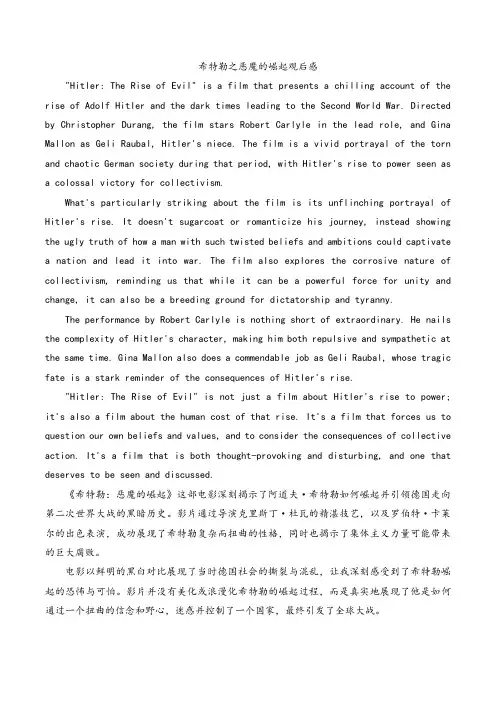
希特勒之恶魔的崛起观后感"Hitler: The Rise of Evil" is a film that presents a chilling account of the rise of Adolf Hitler and the dark times leading to the Second World War. Directed by Christopher Durang, the film stars Robert Carlyle in the lead role, and Gina Mallon as Geli Raubal, Hitler's niece. The film is a vivid portrayal of the torn and chaotic German society during that period, with Hitler's rise to power seen as a colossal victory for collectivism.What's particularly striking about the film is its unflinching portrayal of Hitler's rise. It doesn't sugarcoat or romanticize his journey, instead showing the ugly truth of how a man with such twisted beliefs and ambitions could captivate a nation and lead it into war. The film also explores the corrosive nature of collectivism, reminding us that while it can be a powerful force for unity and change, it can also be a breeding ground for dictatorship and tyranny.The performance by Robert Carlyle is nothing short of extraordinary. He nails the complexity of Hitler's character, making him both repulsive and sympathetic at the same time. Gina Mallon also does a commendable job as Geli Raubal, whose tragic fate is a stark reminder of the consequences of Hitler's rise."Hitler: The Rise of Evil" is not just a film about Hitler's rise to power; it's also a film about the human cost of that rise. It's a film that forces us to question our own beliefs and values, and to consider the consequences of collective action. It's a film that is both thought-provoking and disturbing, and one that deserves to be seen and discussed.《希特勒:恶魔的崛起》这部电影深刻揭示了阿道夫·希特勒如何崛起并引领德国走向第二次世界大战的黑暗历史。
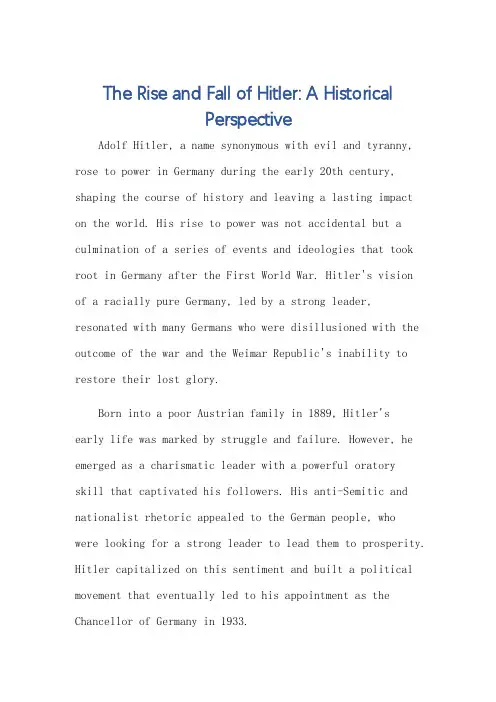
The Rise and Fall of Hitler: A HistoricalPerspectiveAdolf Hitler, a name synonymous with evil and tyranny, rose to power in Germany during the early 20th century, shaping the course of history and leaving a lasting impact on the world. His rise to power was not accidental but a culmination of a series of events and ideologies that took root in Germany after the First World War. Hitler's visionof a racially pure Germany, led by a strong leader, resonated with many Germans who were disillusioned with the outcome of the war and the Weimar Republic's inability to restore their lost glory.Born into a poor Austrian family in 1889, Hitler'searly life was marked by struggle and failure. However, he emerged as a charismatic leader with a powerful oratoryskill that captivated his followers. His anti-Semitic and nationalist rhetoric appealed to the German people, whowere looking for a strong leader to lead them to prosperity. Hitler capitalized on this sentiment and built a political movement that eventually led to his appointment as the Chancellor of Germany in 1933.Under Hitler's leadership, Germany transformed into a totalitarian state where freedom of speech and press were curtailed, and dissent was ruthlessly suppressed. The Nazi Party, led by Hitler, implemented a series of draconian laws that targeted Jews, political opponents, and anyone who did not conform to the Nazi ideology. These actions led to the systematic persecution and extermination of millions of people, most notably the Jews, in what came to be known as the Holocaust.Hitler's ambition did not stop at domestic policies. He saw Germany as a global power and sought to expand its influence beyond its borders. This led to the annexation of Austria and Czechoslovakia, and the invasion of Poland, which marked the beginning of the Second World War.Hitler's military ambitions were fueled by his belief in the superiority of the Aryan race and his desire to create a "New Order" in Europe, where Germany would rule as the master race.However, Hitler's dreams of global domination were shattered by the combined might of the Allied forces. After a series of military defeats, Hitler committed suicide inhis bunker in Berlin on April 30, 1945, marking the end of his reign of terror. The Nazis' defeat marked a turningpoint in history, as the world began to recover from the horrors of war and sought to build a more inclusive and tolerant society.Hitler's legacy is a reminder of the dangers of extremism and the consequences of ignoring the warnings of history. His rise to power and the atrocities committed under his regime serve as a stark warning against the abuse of power and the dangers of fanaticism. Hitler's story is a tragic reminder that when unchecked, the desire for power and supremacy can lead to catastrophic consequences.**希特勒的崛起与覆灭:历史视角**阿道夫·希特勒,这个名字与邪恶和暴政同义,在20世纪初的德国崭露头角,改变了历史的进程,给世界留下了深远的影响。
一篇关于希特勒的背景和影响英语作文Who Was Adolf Hitler?Adolf Hitler was a very bad man who lived in Germany a long time ago. He was the leader of the Nazi Party and became the ruler of Germany from 1933 until 1945 during World War II. Hitler had a huge impact on history because of the terrible things he did and the millions of people he hurt.Hitler's Early LifeHitler was born in 1889 in Austria. As a young man, he struggled to make friends and do well in school. He failed to get into art school and drifted around doing odd jobs. When World War I started in 1914, Hitler joined the German army and served as a messenger on the front lines. He was awarded some medals for bravery.After the war ended in 1918, Hitler was very upset that Germany had lost. He blamed Jewish people and communists for Germany's defeat. In 1919, he joined a small far-right political party called the German Workers' Party which later became the Nazi Party.Hitler and the Nazi PartyThe Nazi Party believed that the "Aryan" German people were a superior master race. They discriminated against Jewish people, criticized democracy, and wanted to unite allGerman-speaking areas into one great German empire.Hitler was a powerful public speaker who could stir up a lot of anger and hatred. As the Nazi Party grew stronger in the 1920s, its members used violence against opponents and Jewish people. In 1923, Hitler tried to take over the government in Munich but his attempt failed and he went to jail.After getting out of jail, Hitler decided to try building his Nazi movement peacefully and through democratic means at first. The Nazi Party gained more support from Germans who were very unhappy about economic problems like high unemployment after the Great Depression started in 1929.Hitler Becomes Dictator of GermanyIn 1933, Hitler was appointed Chancellor of Germany after the Nazi Party won the largest share of seats in parliamentary elections. Once in power, Hitler quickly made himself an absolute dictator, outlawed all other political parties, and had his opponents arrested or killed. Through fear and propaganda, he enforced the Nazi racist beliefs across German society.World War II and the HolocaustAfter becoming dictator, Hitler openly defied the Treaty of Versailles that had been imposed on Germany after World War I. He rapidly re-armed the German military and started making territorial demands to unite ethnic Germans outside Germany's borders. This aggression led Britain and France to declare war on Germany in 1939, starting World War II in Europe.As part of Hitler's deranged racist beliefs, he wanted to create a "master race" based on people with blonde hair and blue eyes. He viewed Jews, Slavs, Roma people, disabled people, and others as racially inferior. The Nazis brutally persecuted these "undesirables", killing as many as they could in what is known as the Holocaust.Millions of Jews were rounded up into overcrowded ghettos and Nazi death camps like Auschwitz. There, they were starved, forced into harsh labor, experimented on in cruel ways, or systematically killed in gas chambers. By the end of the war in 1945, the Nazis had slaughtered around 6 million Jewish people along with millions of others in the Holocaust - one of humanity's most evil genocides.The End of Hitler's ReignEven though the Nazis controlled most of Europe at one point, the Allies (Britain, the U.S., Soviet Union, and others) fought back fiercely and liberated territory from Hitler's forces. After the Soviets captured Berlin in 1945, Hitler committed suicide rather than surrendering. World War II finally ended a few months later when Germany and Japan surrendered.Hitler's racist ideas and horrific genocide made him one of the most hated men in all of history. Thanks to defeating the Nazis, the world made progress in protecting human rights and ethnic minorities. The Holocaust Museum in Washington D.C. commemorates the victims and educates people about standing up against hatred and discrimination.Hitler's Nazi regime shows how dangerous racism and extreme nationalism can become when intolerant leaders rise to absolute power. The Holocaust is a constant reminder that we must be accepting of all people and never allow such a tragedy to happen again.。
关于希特勒的英语作文Adolf Hitler, the infamous leader of the Nazi Party and the orchestrator of World War II, remains a figure of historical controversy and study. This essay aims to explore his rise to power, the impact of his policies, and the lessons that can be drawn from this dark chapter in human history.Hitler's ascent to power began in the wake of Germany's economic and political instability following World War I. The Treaty of Versailles, which imposed heavy reparations on Germany, led to hyperinflation and widespread unemployment. Hitler capitalized on the nation's discontent, promising to restore Germany's economy and national pride. His charismatic oratory and the Nazi Party's propaganda machine played a crucial role in his election as Chancellor in 1933.Once in power, Hitler implemented a series of policies that centralized authority and suppressed dissent. The establishment of the totalitarian regime led to the persecution of various groups, including Jews, homosexuals, and disabled individuals, under the guise of racial purity and eugenics. The Holocaust, one of the most horrific genocides in history, resulted in the systematic murder ofsix million Jews and millions of others.Hitler's aggressive foreign policies, including the invasion of Poland in 1939, ignited World War II. The war ledto the deaths of tens of millions of people and caused unprecedented destruction across Europe and beyond. Hitler's ultimate goal of a Thousand-Year Reich was thwarted by the combined forces of the Allies, and he died by suicide in 1945 as the Allies closed in on Berlin.The study of Hitler's regime offers critical lessons on the dangers of totalitarianism, the consequences of unchecked power, and the importance of vigilance against the rise of extremist ideologies. It also highlights the need for international cooperation and the rule of law to prevent future atrocities.In conclusion, Adolf Hitler's legacy is a stark reminder of the potential for human cruelty and the devastating consequences of ideological extremism. As we reflect on this period, it is imperative that we learn from the past to build a more peaceful and just future.。
人物传记英语作文希特勒Adolf Hitler was a complex and controversial figure who left an indelible mark on the course of history. Born in 1889 in Braunau am Inn, Austria, he would go on to become one of the most influential and notorious leaders of the 20th century.Growing up, Hitler faced a tumultuous childhood. His father, Alois, was a stern and demanding man, while his mother, Klara, was a more nurturing and compassionate figure. This dichotomy would shape Hitler's own personality and worldview in profound ways. As a young man, he struggled to find his place in the world, experiencing bouts of homelessness and rejection from the prestigious Vienna Academy of Fine Arts.It was during this period of uncertainty and hardship that Hitler's political ideology began to take shape. He became increasingly drawn to the ideas of nationalism, anti-Semitism, and racial purity, which would later form the foundation of the Nazi party. In 1919, he joined the German Workers' Party, a small political group that shared his extremist views. Over the next few years, Hitler worked tirelessly to transform the party into a formidable political force, honing his skills as a charismatic speaker and strategist.The rise of the Nazi party was meteoric, fueled by the economic and social upheaval of post-World War I Germany. Hitler's promises of a return to German greatness, coupled with his scapegoating of Jews and other minority groups, resonated with a population that felt disillusioned and disempowered. In 1933, he was appointed Chancellor of Germany, and within a year, he had consolidated his power, establishing a totalitarian regime that would go on to commit some of the most horrific atrocities in human history.As the leader of the Nazi party, Hitler pursued a relentless campaign of territorial expansion and ethnic cleansing. He orchestrated the invasion of neighboring countries, including Poland, France, and the Soviet Union, in a bid to create a vast German empire. At the same time, he oversaw the systematic persecution and genocide of millions of Jews, Roma, and other "undesirable" groups, a campaign that became known as the Holocaust.Despite the overwhelming evidence of his crimes, Hitler's legacy remains a subject of intense debate and fascination. Some view him as a brilliant but deeply flawed leader, while others see him as the embodiment of pure evil. What is undeniable, however, is the profound impact he had on the world, shaping the course of the20th century in ways that continue to reverberate today.In the end, Hitler's downfall came in the form of a devastating defeat at the hands of the Allied powers. As the Nazi regime crumbled and his dreams of a thousand-year Reich lay in ruins, Hitler retreated to his underground bunker in Berlin, where he ultimately took his own life in 1945. His death marked the end of one of the darkest chapters in human history, but the legacy of his actions continues to haunt us, a sobering reminder of the dangers of unchecked ambition, hatred, and the abuse of power.。
希特勒故事英文作文下载温馨提示:该文档是我店铺精心编制而成,希望大家下载以后,能够帮助大家解决实际的问题。
文档下载后可定制随意修改,请根据实际需要进行相应的调整和使用,谢谢!并且,本店铺为大家提供各种各样类型的实用资料,如教育随笔、日记赏析、句子摘抄、古诗大全、经典美文、话题作文、工作总结、词语解析、文案摘录、其他资料等等,如想了解不同资料格式和写法,敬请关注!Download tips: This document is carefully compiled by theeditor. I hope that after you download them,they can help yousolve practical problems. The document can be customized andmodified after downloading,please adjust and use it according toactual needs, thank you!In addition, our shop provides you with various types ofpractical materials,such as educational essays, diaryappreciation,sentence excerpts,ancient poems,classic articles,topic composition,work summary,word parsing,copyexcerpts,other materials and so on,want to know different data formats andwriting methods,please pay attention!Adolf Hitler, a name that evokes strong emotions and controversy. Some see him as a charismatic leader who brought Germany out of economic turmoil, while others see him as a ruthless dictator responsible for the deaths of millions. His rise to power and the atrocities committed during his reign continue to be a subject of fascination and horror for many.Born in Austria in 1889, Hitler's early life was marked by struggle and disappointment. He aspired to be an artist, but his applications to art school were rejected. He then turned to politics and eventually became the leader of the Nazi Party. His fiery speeches and promises to restore Germany's former glory resonated with many who were disillusioned with the post-World War I political and economic situation.Once in power, Hitler wasted no time in implementing his vision of a racially pure and militaristic society. TheNuremberg Laws stripped Jews of their rights, and the Holocaust saw the systematic extermination of six million Jews. Hitler's aggressive foreign policy led to the outbreak of World War II, which resulted in the deaths of millions more.Despite his brutal regime, Hitler's charisma andability to manipulate public opinion cannot be denied. He was able to rally the German people behind him and convince them to support his radical agenda. His ability to inspire loyalty and devotion in his followers is a chilling reminder of the power of propaganda and manipulation.In the end, Hitler's reign of terror came to an abrupt end with his suicide in 1945. The impact of his actions continues to be felt to this day, and the lessons learned from his rise to power serve as a sobering reminder of the dangers of unchecked ambition and the consequences of hate and intolerance.。
Apocalypse:RiseofHitler 二次大战启示录:希特勒崛起Apocalypse: Rise of Hitler二次大战启示录∶希特勒崛起Hitler was the brutal butcher of six million Jews and one of the world's most infamous political leadersHuman experimentation, concentration camps, and the Holocaust are what first come to mind when this man's name is mention ed. He was the brutal butcher of six million Jews and one of the world's most infamous political leaders. However, before all this, Adolf Hitler was just a simple man with simple dreams. Born in Austria in 1889, Hitler had goals of becoming an artist. What changed him into the most destructive force of the 20th century?Despite being born in Austria, Hitler expressed great loyalty to Germany from a young age. After leaving school at the age of 16, he struggled to make a living as a painter in Vienna. That was where many of his extreme political ideas took shape. When WWI broke out, Hitler joined the German army. This further increased his German nationalism and his determination to save Germany. After the war, Hitler entered into politics when he joined the German Worker's Party. This later became the Nazi Party as Hitler rose to power. For more on this Nazi dictator, catch "Apocalypse: Rise of Hitler" on National Geographic Channel this month.人体实验、集中营和大屠杀,上述都是提起这个人的名字时,首先会浮现在大家脑海中的事。